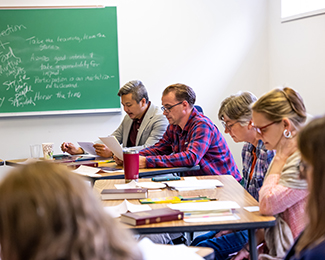Who should consider an MDiv?
The Master of Divinity program is recommended for students seeking a comprehensive preparation for Christian ministry. Persons in leadership roles which assume broad knowledge of the church’s faith, tradition and practice should consider this program. You will study the complete range of theological disciplines which include biblical, theological, historical, contextual, formational and practical ministry studies. In some denominations the Master of Divinity is required for ordination to the Christian ministry.
Why EMS?
- Our formation classes will encourage you to focus on your own formation during the seminary journey, helping you to be healthier in your vocation.
- Supervised field education and Clinical Pastoral Education (CPE) will give you supervised learning experiences in your ministry field.
- You will develop relationships with faculty who can provide mentoring and advice in your ministry.
Dual Degree Programs, Certificates, and Concentrations
As an embedded seminary, EMS is uniquely positioned to connect you to the broader knowledge and resources of Eastern Mennonite University, including the world-renowned Center for Justice and Peacebuilding. We have worked out special dual degree pathways so that you can complete your MDiv alongside the following graduate degrees:
Students at EMS can also use some of the elective credits within their MDiv program to earn a graduate certificate in one of the other programs at Eastern Mennonite University. Some options include:
Students interested in chaplaincy can work toward APC board certification through an MDiv with Chaplaincy concentration.









